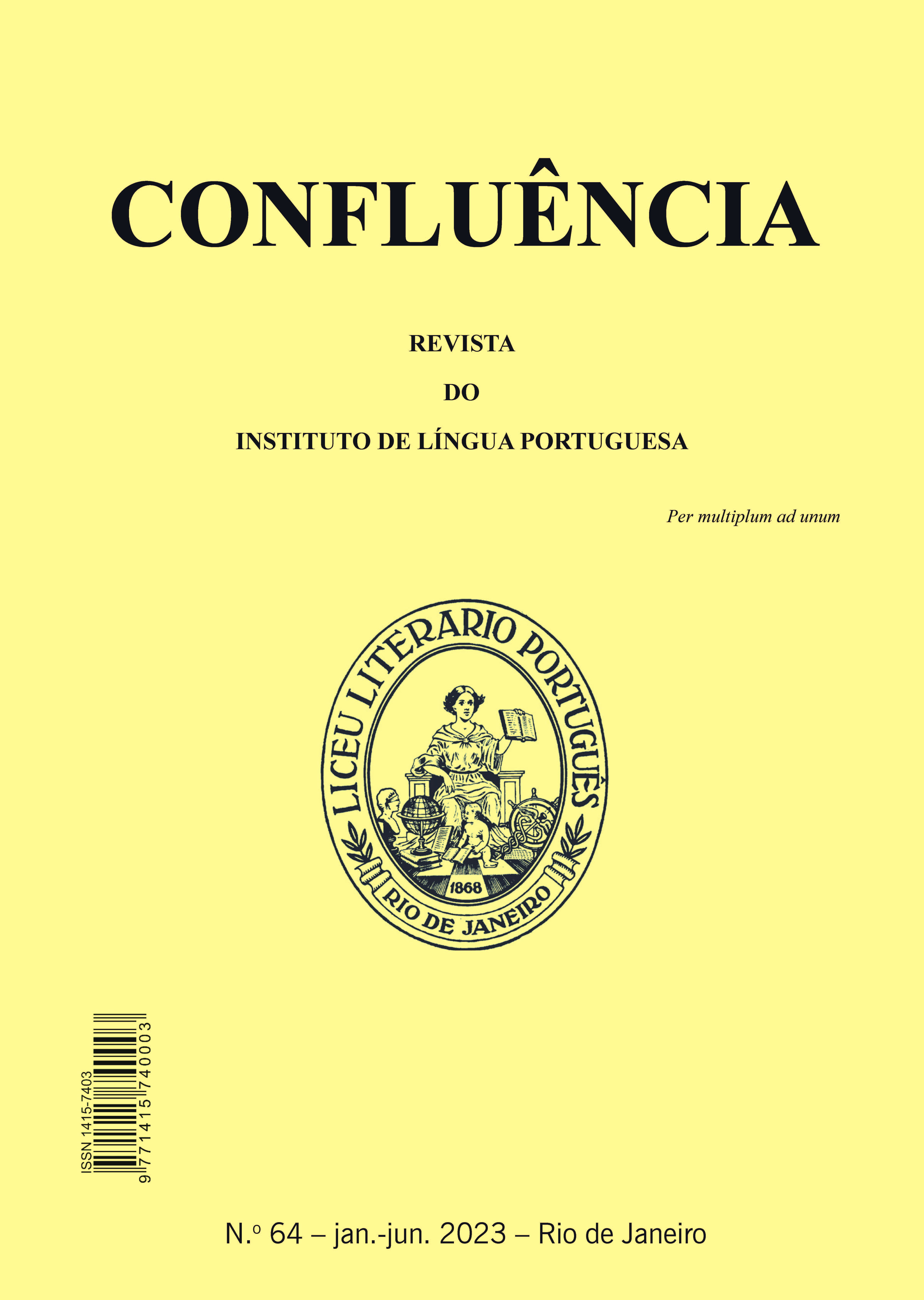“What it means to be young to the end”: a discursive analysis
DOI:
https://doi.org/10.18364/rc.2023n64.1317Keywords:
Discourse, Elderly, Young, Media, IdeologyAbstract
Our goal in this paper is to analyze a report in Veja magazine that deals with the topic of old age. To do this, we use the theoretical assumptions of discourse analysis of French orientation (AD), with the aim of analyzing the possible meanings of the discourse that the media conveys about aging in contemporary society. Thus, we found that there is a representation that old is simply everyone. Analyzed in the report, while promoting the ideal elderly who are willing to have an active life; also ends up being a marginalized topic, idle, idle, time and voice to reveal.
Downloads
References
AUTHIER-REVUZ, Jacqueline. Palavras incertas: as não coincidências do dizer. Campinas, SP: Ed. Unicamp. 2004.
BAKHTIN, Michel. Marxismo e filosofia da linguagem. São Paulo: HUCITEC, 1992.
BAKHTIN, Michel. Estética da Criação Verbal. Trad. Aurora Fornoni Bernadini et al. São Paulo: Martins Fontes, 2003.
BARROS, Mirian Moraes Lins de. A velhice na pesquisa socioantropológica brasileira. In: GOLDENBERG, Mirian (org.). Corpo, envelhecimento e felicidade. Rio de Janeiro, Civilização Brasileira. 2011, pp. 45-64.
BERQUO, Elza. Considerações sobre o envelhecimento da população no Brasil. In. NERI, Ana; DEBERT, Guita (Org.). Velhice e Sociedade. Campinas: Papirus, 1999.
BRANDÃO, Helena H. Nagamine. Subjetividade, argumentação, polifonia. A propaganda da Petrobrás. 1 ª ed. São Paulo: Fundação editora da UNESP, 1998.
BRANDÃO, Helena H. Nagamine. Introdução à análise do discurso. 2ª ed. Campinas, São Paulo: editora da Unicamp, 2004.
BUENO, Micheli S.; OLIVEIRA FILHA, Elza A. Revista Veja e a terceira idade. Univers. Positivo:Curitiba, PR. Disponível em: http://www.intercom. org.br/papers/nacionais/2009/resumos/R4-1027-1.pdf. Acesso em: 26 de julho de 2013.
CARDOSO, Silvia Helena Barbi. Discurso e ensino. Belo Horizonte; Autêntica, 1999.
CHARAUDEAU, Patrick. Discurso das Mídias. Trad: Angela M. S. Corrêa. São Paulo: Contexto, 2006.
DEBERT, Guita Grin. A reinvenção da velhice: socialização e processos de reprivatização do envelhecimento. São Paulo: Editora da Universidade de São Paulo, Fapesp, 1999, 2002.
DICIONÁRIOWEB. Termo-Velha. Disponível em: http://www.dicionarioweb. com.br/velha/ Acessado em 29 de julho de 2013.
FERNANDES, Cleudemar Alves. Análise do Discurso: reflexões introdutórias. São Paulo: Editora Claraluz. 2. ed., rev. Atual., 2008.
FOUCAULT. Michel. A ordem do discurso. Rio de Janeiro: Forense Universitária, 1996.
FOUCAULT. Michel. A arqueologia do saber. Rio de Janeiro: Forense Universitária, 2008.
FREITAS, Silvane Aparecida de. Imagens de idosos em discursos midiáticos. Projeto de Pesquisa. Dourados. UEMS/CNPQ. 2011.
FREITAS, Silvane Aparecida de. As representacões da família apresentadas nas Propagandas da Qualy. Rio de Janeiro: Confluência, 2010. Disponível em: http://llp.bibliopolis.info/confluencia/pdf/748.pdf. Acesso em: em 06 de setembro de 2014.
GREGOLIN, Maria do Rosário Valencise. Discurso e mídia: a cultura do espetáculo. São Carlos: Claraluz, 2003.
GREGOLIN, Maria do Rosário Valencise. Análise do discurso e mídia: a (re) produção de identidades. Comunicação, Mídia e Consumo. São Paulo. v. 4, n. 11, p. 11-25, 2007. Disponível em: <http://revistacmc.espm.br/index.php/revistacmc/issue/view/11/showToc>. Acesso em: 14 abr. 2012.
GUERRA, Vânia Maria Lescano. Literatura e leitura: a história da mudança é uma história ainda a construir. In: Antonio Rodrigues Belon & Sheila Dias Maciel (Org.). Em diálogo: estudos literários e linguísticos. 1ª.ed. Campo Grande (MS): Editora da UFMS, 2004, v. 1. P. 93-108.
GUERRA, Vânia Maria Lescano. Práticas discursivas: crenças estratégias e estilos. São Carlos: Pedro & João Editores, 2008.
MASCARO, Sonia de Amorim. O que é velhice. São Paulo: Brasiliense, 2004.
MILAN, Betty. O que é ser jovem até o fim. Revista Veja, São Paulo. edição 2221, ano 44, nº 24, p. 13, 15 de junho de 2011.
MOTTA, Alda Brito da. A juvenilização atual das idades. In: Caderno Espaço Feminino. V. 25, n. 2, Uberlândia-MG: julho/dezembro, 2012. http://www.seer.ufu.br/index.php/neguem/article/viewFile/21802/11963
NOVAES, Maria. Psicologia da Terceira Idade: Conquistas possíveis e Rupturas Necessárias. 2. ed. Rio de Janeiro: NAU, 1997.
ORLANDI, Eni Puccinelli. Análise do Discurso: princípios e procedimentos. Campinas: Pontes, 1999.
ORLANDI, Eni Puccinelli. A linguagem e seu funcionamento: as formas do discurso. 5 ed. Campinas: Pontes, 2009.
PINHEIRO JUNIOR. Gilberto. Sobre alguns conceitos e características de velhice e terceira idade: uma abordagem sociológica. Linhas, Florianópolis. v.6, n.1, 2005. Disponível em: <http://www.periodicos.udesc.br/index.php/linhas/article/viewFile/1255/1067>. Acesso em: 17 jan. 2013.
SCALZO, Marília. Jornalismo de Revista. São Paulo: Contexto, 2003.
SIBILIA, Paula. O corpo velho com uma imagem com falhas: a moral da pele lisa e a censura midiática da velhice. In: Comunicação, mídia e consumo. V. 9, n. 26, São Paulo: SP, 2012. http://revistacmc.espm.br/index.php/revistacmc/index
SILVEIRA, Mara Regina. O Ensino de Língua Inglesa e o Imaginário Sobre o Idoso. Tese. Campinas: SP, 2010 . Instit. de estudos da linguagem. Mestrado em linguística aplicada. Disponível em: http://www.bibliotecadigital.unicamp. br/document/?code=000779042. Acessada em 26 de julho de 2013.
Downloads
Published
Issue
Section
License
Copyright (c) 2022 hellen ferreira da silva alves dos santos

This work is licensed under a Creative Commons Attribution-NonCommercial 4.0 International License.
The author who publishes in this journal agrees to the following terms: The author maintains the copyright and grants the journal the right of first publication, with the work simultaneously licensed under the Creative Commons Attribution License that allows the sharing of the work with acknowledgment of the authorship and initial publication in this journal. The author is authorized to take additional contracts separately, for non-exclusive distribution of the version of the work published in this journal (eg publish in institutional repository or as a book chapter), with acknowledgment of authorship and initial publication in this journal. The author is allowed and encouraged to publish and distribute his work online (eg in institutional repositories or on their personal page) at any point before or during the editorial process, as this can generate productive changes, as well as increase the impact and citation of the published work.








